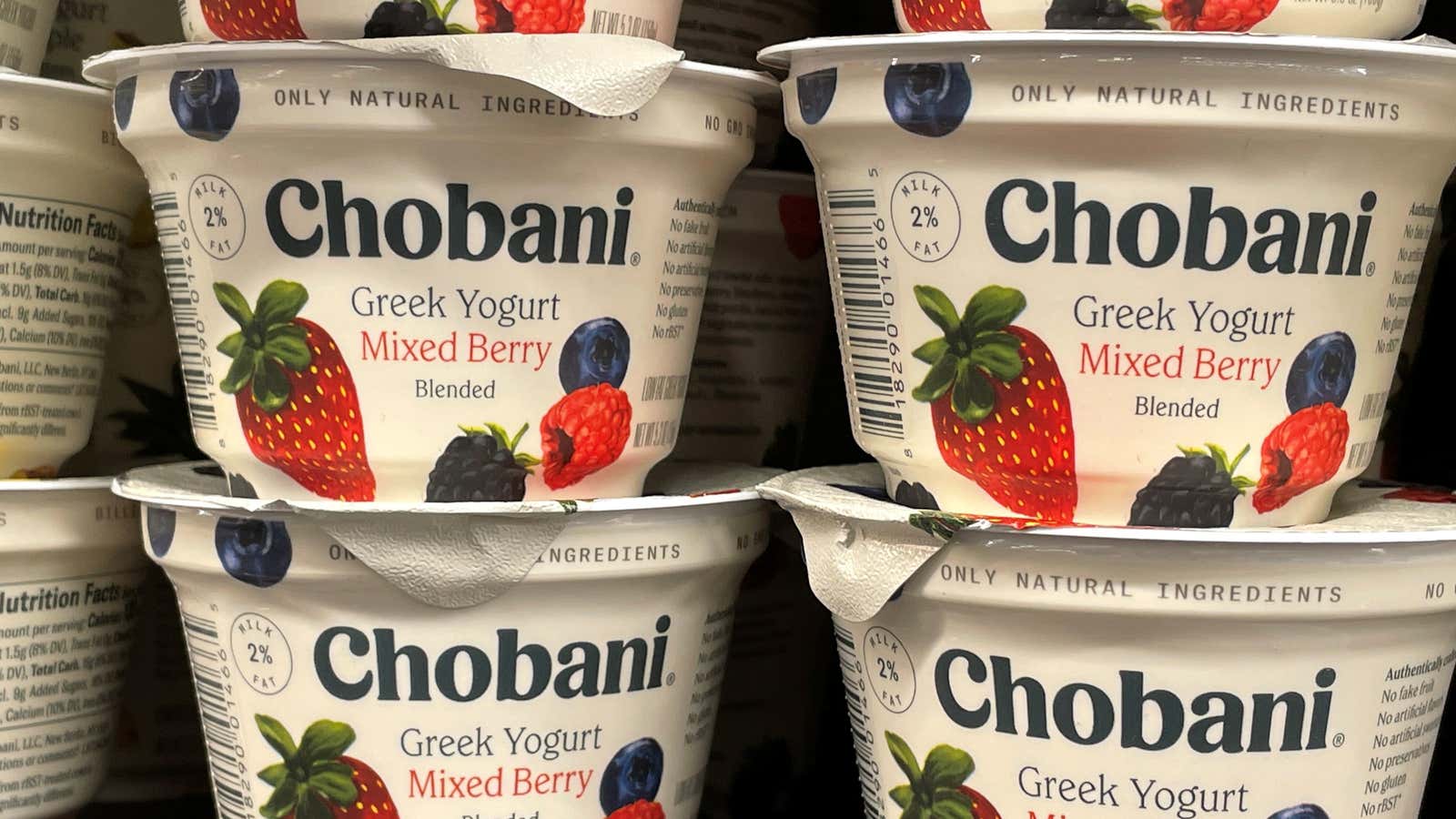Chobani filed its regulatory paperwork to go public yesterday (Nov. 17), joining Allbirds and Sweetgreen as mission-driven companies that have recently sold stock to the public or announced their intentions to do so.
The yogurt company, which plans to list its shares on the Nasdaq exchange under the ticker CHO, reported $1.4 billion in net sales, which refers to total sales minus its returns, allowances, and discounts, in 2020, up from $1.3 billion the year before. And while the company may still falter, it has so far successfully defied the odds to grab 20% of the US yogurt market.
In the filing, Chobani’s CEO Hamdi Ulukaya said he was inspired to start the company by his childhood in Turkey, where he had access to high-quality yogurt made on his family’s farm. In 2005, he bought a fully-equipped yogurt company in New Berlin, New York—previously owned by a large food conglomerate—and two years later, after tinkering with the details of the product, Chobani launched. To date, the yogurt company, which has over 2,000 employees, is sold in 95,000 retail locations globally. The company has expanded beyond yogurt and into Chobani Oat milk and Chobani coffee creamer. “[W]e are still a young, energetic, entrepreneurial company,” said Ulukaya in the filing.
Chobani currently holds 44% of the US greek yogurt market. And, according to its filing, as of October, it’s the market leader among all US yogurt makers, outselling long-entrenched rivals such as General Mills’ Yoplait and Dannon, made by French giant Danone.
Chobani’s innovative roots
From the start, Ulukaya said he knew Chobani had to stand out from its legacy competitors. “When I saw this was going to work, I have two, three biggest dairy companies in the world as my competitor, if they see this is successful, the next day they can make this faster, better,” said Ulukaya in an interview with Inc. Magazine in 2014. “So as a startup, I don’t have a lot of things working for me. We have to be fast, really really fast—faster than anything in the [consumer packaged goods] world. So that means risks.”
The company owns parts of its supply chain, allowing it to move products from concept to shelf quickly. For instance, Chobani Oat went from idea to commercial production in less than 12 months, according to its filing. Launched in 2020, it has captured 15% of the US oat milk market and is the third largest company in the category, according to the filing.
Chobani owns in-house production capabilities across three plants in New York, Idaho, and Australia, a lab facility in New Jersey, where microbiologists and biochemists research on food innovation, and has a creative agency and packaging design team, numbering more than 30 people, who work on building the brand ethos.
That allows the yogurt company to constantly innovate. In addition to the range of products, it has launched new ingredient profiles and formats, including Chobani with Zero Sugar or snack-oriented products like Chobani Flip. Last year, net sales for non-yogurt products hit $157.7 million, according to the filing.
Not just a yogurt company
Early on, Chobani focused on building brand recognition—launching not just in specialty stores but also in supermarkets, according to its filing. “People got to know us before the other guys that put their products, imitation products, and copies into the marketplace. And when they did, the consumers already knew what to expect from real Chobani, real greek yogurt,” he said in the interview with Inc.
The company has carefully cultivated its image over the years to stand out from its competitors. In 2016, Chobani ran a TV ad campaign blasting Dannon for containing artificial sweeteners, and, in another video, Yoplait, for containing potassium sorbate, claiming, “that stuff is used to kill bugs.”
Chobani also wanted to resonate with its audience—not just as a food company but as one making a social and environmental impact. Refugees and immigrants make up 30% of its manufacturing workforce, drawing backlash from Breitbart news, a far-right news publication, for its immigration-friendly stance. The yogurt company also paid off the school lunch debt for students in several districts and launched a “Fair Trade Dairy” certification for farmers. In 2016, Chobani announced that it would give shares worth up to 10% of the company to its employees when it goes public or is sold, a move more often associated with tech companies.
The company’s initiatives “creates authentic, mutual connections with consumers who are increasingly seeking an emotional, values-based relationship with the brands they choose—a core insight of our business since day one,” the filing states.
